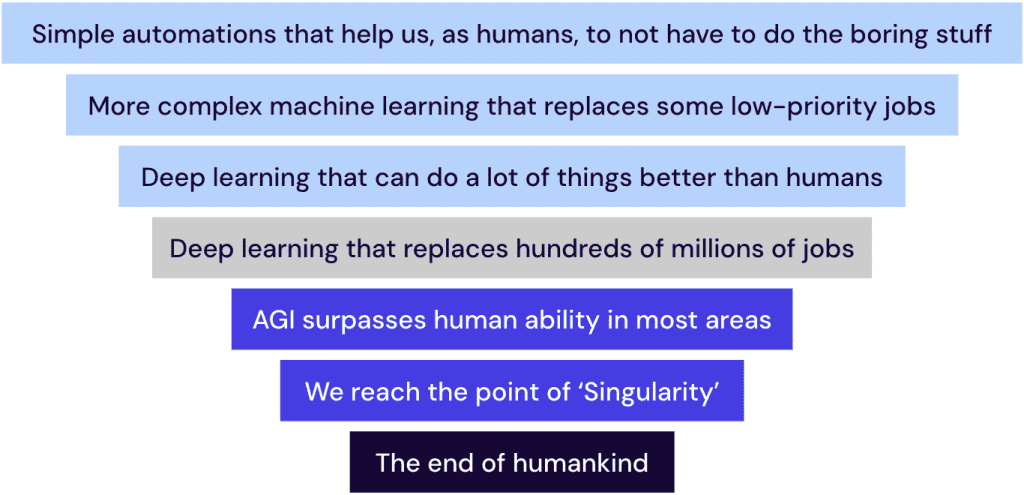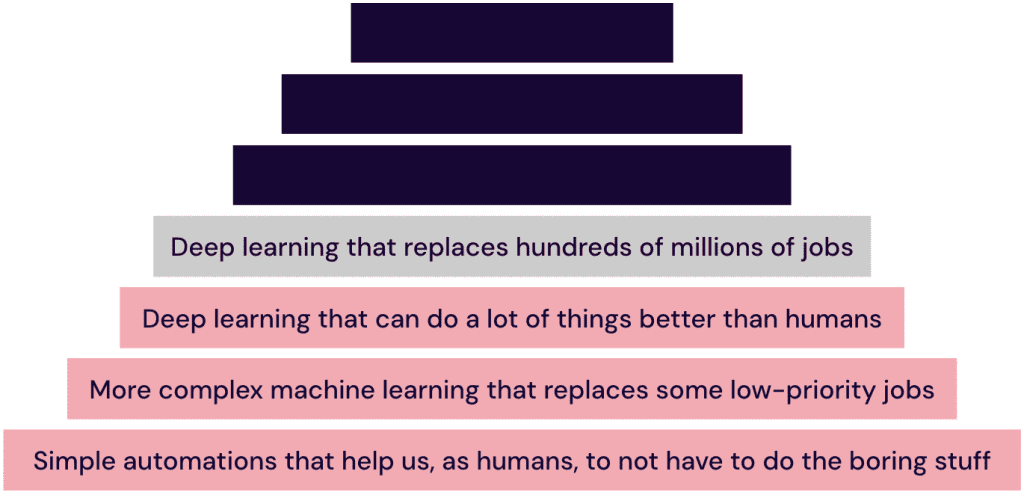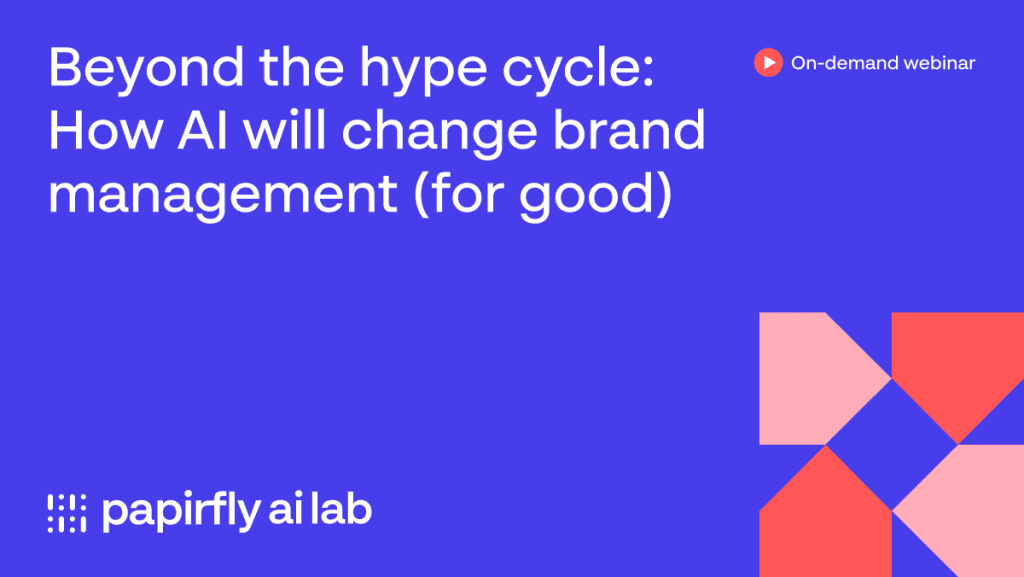We’ve looked at a number of areas where Artificial Intelligence will drive real and meaningful change in this AI-Illuminate series. We’ve looked at how Hollywood has convinced us of eternal doom, we’ve considered how machines will rid us of meaningless tasks, and we’ve discussed ways that Machine Learning might not build Society 2.0 as equitably as we’d like.
But as with all situations, there are two sides to the coin.
The Staircase to (AI) Hell
Let’s start with the depressing take on the journey ahead. Introducing the Staircase to (AI) Hell.

Beginning with ‘simple automations’ doesn’t feel that scary. Human beings are inherently lazy, we don’t generally like repetitive things, and if there’s a faster way to do something we’ll usually opt for it. Enter the robots! It’s easy to envisage a world where anything even remotely repetitive is simply done by a machine.
Even as we move to the next ‘step’ of the staircase, and we start to see some ‘low priority’ jobs being replaced, most people have little-to-no concern yet. Perhaps because most people discussing the AI debate right now consider their own jobs to be higher priority.
As we approach the step where Deep Learning can do a lot of things better than humans, we end the ‘light blue’ section of this staircase and start entering darker territories.
The first real grey area is the point in time where Deep Learning transfers billions of tasks from humans, replacing hundreds of millions of jobs. We’re no longer ‘just’ talking about the jobs most people think are not theirs – we enter a period of wholesale change with white-collar and blue-collar jobs equally threatened. What do the newly-unemployed do? How do they survive?
As we enter the ‘dark blue’ steps of the staircase we see General Artificial Intelligence (AGI) surpassing most abilities of most humans, which then leads to the point of ‘Singularity’ where machines become too powerful for their human creators to control.
At this point it really is humans vs. robots and, by all accounts, we don’t look set to win.
It is somewhat depressing.
Who can save us?
The Staircase to (AI) Heaven
I believe we can, as is common with many of the debates around AI, look to the past for our saviour. Isaac Newton to be precise. In Newton’s Third Law, he stated that for every action in nature there is an equal and opposite reaction. So perhaps we can turn the Staircase to (AI) Hell into a Staircase of (AI) Heaven? What could that look like?

Well, in Newton-friendly terms, it’s equal and opposite. When we flip the pyramid upside down, we start with the same simple automations that help us humans not have to do the boring things we don’t want to do. This, in itself, can only be a good thing. More efficiency can definitely help us focus on other things. It could likely also be part of the solution to some of our big global problems like waste and the distribution of equitability.
As we progress through the next two steps, there’s a positive to each too.
Complex AI replacing ‘low priority’ jobs is fine if what we mean by ‘low priority’ jobs are jobs humans are not very good at, where it’s dangerous to their health, or where we expend resources doing things unnecessarily. As long as we start to migrate those same displaced people into new, better, roles and / or find ways to replace their income.
Likewise, where AI can do things better than humans, let’s use AI. Of course it makes sense. If a machine is 10x more accurate at doing something, let the machine do it. Where a human+machine combination excels, like in the visual detection of some cancers, then let’s make it happen. Again, we just must not forget to plan for the displaced. Is it time to look at Universal Basic Income (UBI) models again, for example?
Where that displacement of jobs becomes wider and deeper, we do need to be ready. If AI is set to change a billion jobs within the decade, as some academics predict, our policymakers, lawmakers, and politicians need to be working on Plan B now. If we are to leverage the opportunity of the technologies we have created, we need to be ready.
We’ve been here before. The agricultural revolutions of the 19th Century – forever changing what farm labour looked like through the introduction of machinery – are the very reason we’re all able to sit here and read this article when we’d otherwise be out bringing in the harvest so our families could eat. I love the countryside but I’m very grateful for the historic jobs displacement that means I don’t need to grow my own wheat every year.
Daring to dream of AI’s future
The next few steps on the Staircase to AI Heaven are not filled in yet. We don’t know what the future will hold – but we can dare to dream…
Eradicating waste. Making human error a thing of the past, being able to predict things perfectly. Transforming health outcomes. Increasing quality of life for everyone. Curing cancer. Moving beyond fiat money. Driving equitability. Understanding where we come from. Closing the income gap. Working globally as one. People living longer. The end of discrimination. Solving the climate crisis.
It might not all be possible – and certainly not within our lifetimes – but it’s a wonderful AI Heaven to believe in.
Watch our on-demand webinar

Table of contents:
